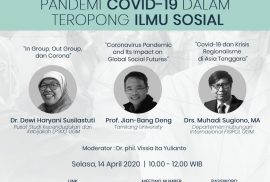Seri kelima dalam Webinar SEATALK Pusat Studi Asia Tenggara Universitas Gadjah Mada yang dilaksanakan pada Kamis, 12 Mei 2020. Webinar ini mengundang Dr. Siddharta Chandra dari Michigan State University, USA dan Sumadi Lukman Anwar, MD., Ph.D, FKKMK UGM
Lessons from the 1918 influenza pandemic for the COVID-19 pandemic and Experience from Cancer Navigation in Indonesia
“1918 inlfluenza pandemic is the mother virus which gave birth to major global pandhemic which had taken the lives of millions of people worldwide”, said Prof. Siddarth Candra, an epidimiolgist in the WEBINAR series of South East Asia Talk, organized by the Centre of Southeast Asian Social Studies (CESASS), Universitas Gadjah Mada, a center of excellence in social science under the Indonesian Ministry of Research, Technology and Higher Education since 2016. This Webinar 36# was a cooperation between CESASS and the American Institute of Indonesian Studies (AIFIS), State University of Michigan, USA.










